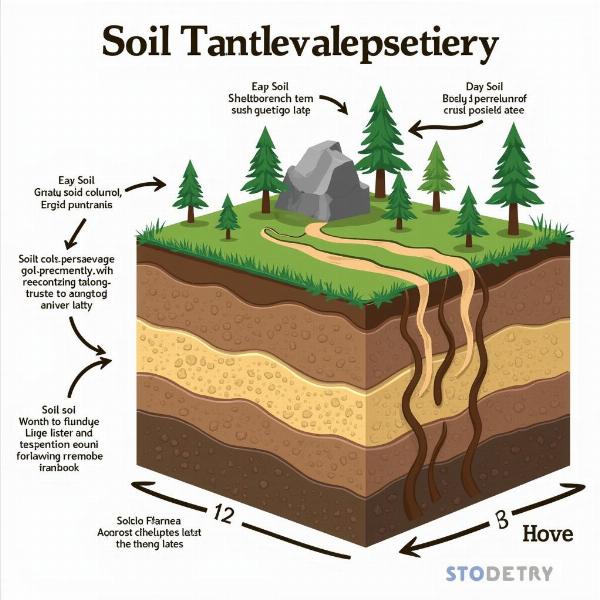Understanding the meaning of “weathered rock” in Hindi is crucial for anyone studying geology, geography, or even just interested in the natural world. This article explores the various Hindi terms used for weathered rock, the weathering process, its significance, and related concepts. We’ll also delve into the cultural and linguistic nuances associated with these terms within the Indian context.
What Does Weathered Rock Mean?
Weathered rock refers to rock that has been altered or broken down by atmospheric or biological processes. This breakdown can be physical, chemical, or biological. In Hindi, weathered rock can be referred to as अपक्षयित शैल (apakshayit shail), where “apakshayit” means weathered and “shail” means rock. This term accurately captures the essence of weathered rock, highlighting the process of degradation. Other related terms include क्षरणित शैल (ksharanit shail) implying eroded rock, and विघटित शैल (vighatit shail), suggesting decomposed rock.
Understanding the Weathering Process in the Indian Context
India’s diverse climate, ranging from the Himalayas to the coastal plains, significantly influences the weathering process. The intense heat and monsoons in many parts of the country accelerate chemical weathering, while freeze-thaw cycles in mountainous regions contribute to physical weathering. Understanding these regional variations is key to grasping the full meaning of “weathered rock” within the Indian context. The formation of soil, a vital resource for agriculture, is directly linked to the weathering of parent rock.
What are the types of weathering? The primary types are physical, chemical, and biological weathering. Physical weathering involves the mechanical breakdown of rocks, while chemical weathering involves changes in the rock’s chemical composition. Biological weathering involves the actions of living organisms, like plants and microbes.
Weathered Rock and Soil Formation: A Connection
Weathered rock plays a crucial role in soil formation. The breakdown of rocks provides the mineral components of soil. In India, the type of weathered rock significantly influences the characteristics of the resulting soil, impacting agricultural practices and crop yields. For example, the weathering of basalt in the Deccan Plateau gives rise to fertile black soils. Understanding the link between weathered rock and soil formation is crucial for sustainable land management. This ties closely to the Hindi terms for “parent material” (जनक सामग्री – janak samagri) and “soil profile” (मृदा परिच्छेदिका – mrida parichchhedika).
How does weathered rock contribute to soil formation? The weathering process breaks down rocks into smaller particles, releasing essential minerals and nutrients. These particles, along with organic matter, form the basis of soil.
 Weathered Rock and Soil Formation
Weathered Rock and Soil Formation
The Importance of Understanding “Weathered Rock”
The concept of weathered rock is not just an academic exercise. It has practical implications for agriculture, construction, and environmental management. Understanding the properties of weathered rock is essential for building stable structures and for mitigating the risks of landslides and soil erosion. Furthermore, the weathering process plays a vital role in the Earth’s carbon cycle, impacting climate change.
Conclusion
“Weathered rock”, or अपक्षयित शैल (apakshayit shail) in Hindi, is a fundamental concept in understanding the Earth’s surface processes. Its significance extends beyond geology, influencing agriculture, construction, and environmental management. Understanding the various Hindi terms related to weathering and the cultural context enhances our appreciation of the natural world and its impact on human life.
FAQ
- What is the Hindi word for weathered rock? The most common term is अपक्षयित शैल (apakshayit shail).
- How does weathering affect agriculture? Weathering influences soil formation, which directly impacts crop growth and yield.
- What is the difference between weathering and erosion? Weathering is the breakdown of rock, while erosion is the transportation of weathered material.
- Why is understanding weathered rock important? It’s crucial for agriculture, construction, and environmental management.
- What are the factors affecting weathering? Climate, rock type, and biological activity are key factors.
Related Articles
- exogenic forces meaning in hindi
- parent material meaning in hindi
- formation of soil meaning in hindi
- soil profile meaning in hindi
Meaning-Hindi.in is your one-stop solution for all your Hindi translation needs. We offer a wide range of translation services, specializing in business, legal, technical, website localization, educational, and specialized translations. Our expert linguists ensure accuracy and cultural sensitivity in every project. Contact us today for high-quality, reliable Hindi translations. Email: [email protected], Phone: +91 11-4502-7584. Get in touch with Meaning-Hindi.in today!